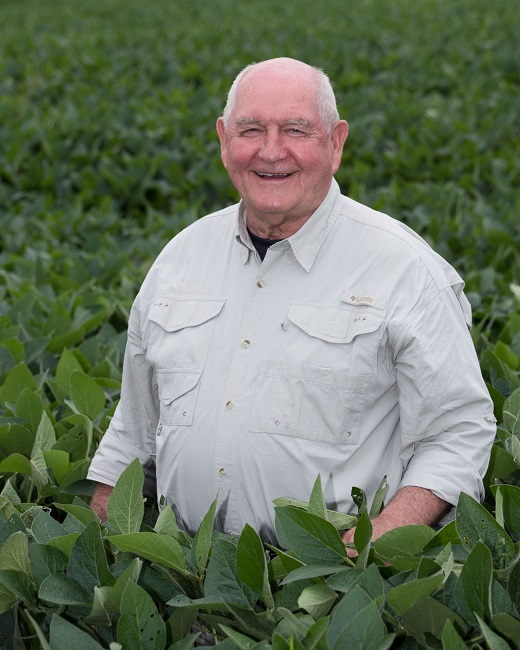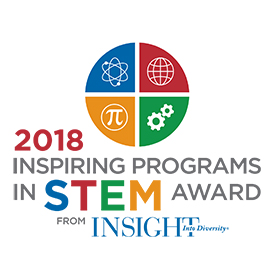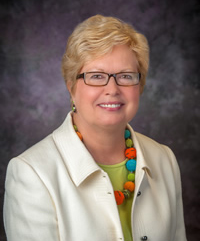10/17/18
K-State Current - October 17, 2018
K-State Current is a weekly news update for the Kansas Board of Regents to apprise the Regents on a few of the many successes and achievements made by K-State faculty, staff and students.

K-State News
US Agriculture Secretary Sonny Perdue presenting Landon Lecture on Nov. 1
Sonny Perdue, U.S. secretary of agriculture, will be the next speaker in Kansas State University's Landon Lecture Series. Secretary Perdue's speech, "Leave It Better Than You Found It: Lessons in Public Service I Learned on the Farm," will be at 10:30 a.m. Thursday, Nov. 1, in McCain Auditorium.
The lecture is free and the public is invited. Please note that for security purposes, no backpacks and large personal bags will be allowed in the auditorium. A bag check will be available in the McCain foyer.
"As a leader in global food systems research, Kansas State University welcomes the opportunity to bring the nation's top agriculture official to campus," said Linda Cook, chair of the Landon Lecture Series and the university's chief of staff and director of community relations. "Secretary Perdue joins a long list of secretaries of agriculture who have participated in the Landon Lecture Series and shared their vision on issues facing an industry that is vital to this university, Kansas, the nation and the world."
The secretary's life was shaped and fashioned growing up on his family's farm. His lecture will focus on the lessons that he learned from family, school, church, sports and caring for the land and animals that formed a foundation of serving others. He has applied the lessons he learned while growing up on the farm to transform the culture of public service to focus on serving the citizens.
Nominated by President Trump, Perdue has been serving as the nation's 31st secretary of agriculture since April 25, 2017, and brings a strong background in agriculture, public service and agribusiness to the post. He grew up on a dairy and diversified row crop farm in rural Georgia. As a young man, he served in the U.S. Air Force, rising to the rank of captain. After his military service, he went on to earn his Doctor of Veterinary Medicine from the University of Georgia and worked in private practice in North Carolina.
Perdue pursued a political career next and served as a Georgia state senator for 11 years. He also was elected president pro tempore by his senate colleagues. As a state senator, he was recognized as a leading authority on issues including energy and utilities, agriculture, transportation, emerging technologies and economic development, and for his ability to grasp the nuances of complex problems.
Elected to two terms as governor of Georgia, from 2003-2011, Perdue was credited with transforming a budget deficit into a surplus, dramatically increasing student performance in public schools, and fostering an economic environment that allowed employers to flourish and manufacturers and agricultural producers to achieve record levels of exports. He was named Public Official of the Year in 2010 by Governing magazine.
The secretary followed his public service with a successful career in agribusiness, focusing on commodities and transportation in enterprises that have spanned the southeastern U.S. He also has served as a board member for the National Grain & Feed Association and as president of both the Georgia Feed and Grain Association and the Southeastern Feed and Grain Association. Perdue has long-standing, close relationships with the leadership of the American Farm Bureau and has been recognized by the Georgia 4-H and FFA programs, among others, for his leadership in agriculture.
One of the most prestigious lecture series offered at a U.S. college or university, the Alfred M. Landon Lecture Series was instituted in 1966 by former Kansas State University President James A. McCain. The series is a tribute to Alfred M. Landon, who served as governor of Kansas from 1933-1937 and delivered the first lecture in the series, "New Challenges in International Relations," on Dec. 13, 1966. Perdue will be the 179th speaker and 11th secretary of agriculture to take part in the lecture series.
K-State receives 2018 Inspiring Programs in STEM Award
The Kansas State Office for the Advancement of Women in Science and Engineering, or KAWSE, program has received the 2018 Inspiring Programs in STEM Award from INSIGHT Into Diversity magazine.
The KAWSE office creates and facilitates more than 40 events designed to enrich the lives of women in male-dominated science, technology, engineering, and math, or STEM, fields. Programming focuses on networking, professional development, raising awareness of gender inequality/inequity issues with an eye toward similarities and differences across race/ethnicity and class backgrounds, and highlighting the achievements of KSU faculty and staff. KAWSE has programs for middle school students — such as Girls Researching Our World, or GROW; high school students, such as EXploring sCIence, Technology and Engineering, or EXCITE; undergraduate and graduate students, such as SUCCEED; and postdoctoral researchers and faculty, such as ADVANCE.
"We know that many STEM programs are not always recognized for their success, dedication and mentorship for underrepresented students," said Lenore Pearlstein, owner and publisher of INSIGHT Into Diversity magazine. "We want to honor the schools and organizations that have created programs that inspire and encourage young people who may currently be in or are interested in a future career in STEM. We are proud to honor these programs as role models to other institutions of higher education and beyond."
The KAWSE program is staffed by Chardie Baird, executive director; Sara Heiman, program coordinator; and Tawny Ochs, administrative assistant.
Please join me in extending a K-State congratulations and gesture of Purple Pride to the KAWSE team.
K-State Faculty Highlight
K-State researchers receive nearly $1 million to study carbon cycle science in tallgrass prairie

Kansas State University researchers in the Division of Biology recently received a $998,261 award from the Office of Biological and Environmental Research in the Department of Energy to dig deeper into the impacts of landscape change and drought on carbon storage in grasslands.
The project, "Using root and soil traits to forecast woody encroachment dynamics in mesic grassland," is led by Jesse Nippert, associate professor of biology, with Lydia Zeglin, assistant professor of biology, and collaborators Kate McCulloh, assistant professor at the University of Wisconsin-Madison, and Kevin Wilcox, assistant professor at the University of Wyoming.
"Soil contains plant roots, microbes, water and a large amount of carbon originating from dead plants and microbes, from the surface to a meter or more deep," Zeglin said. "Plant root growth brings new carbon into the soil, and stimulates microbial decomposition activity. If decomposition proceeds all the way to carbon dioxide, carbon is released back into the atmosphere."
As woody plants are increasing in many Kansas grasslands, they could add more carbon to subsurface soil or stimulate microbial activity that depletes existing carbon stocks. The new study will identify changes in soil carbon pools in grasslands as a consequence of increased woody plant growth and increased drought frequency and intensity.
"Low water availability also affects the amount and structure of root growth, and decomposition activity, and thus the distribution of carbon inputs to the soil," Nippert said. "Shrub encroachment and drought happen concurrently, making it a particular challenge to predict changes in the net ecosystem carbon balance."
This project will use rainfall exclusion experiments at the Konza Prairie Biological Station as a platform for data collection. Nippert and colleagues will perform detailed investigations of root and soil traits at varying soil depths, to capture the varying dynamics of grasses and shrubs, and the impacts of frequent drought. The data will then be used to model the carbon balance of grasslands, including the new information on the relationship between shrub encroachment, drought and carbon cycling. The details of these coupled plant-soil-microbial interactions will improve the representation of subsurface processes in Earth System Models and bring greater clarity to forecasts of dynamic changes in ecosystem structure in grasslands and rangelands, in the Flint Hills and beyond.
More information on the funding program, objectives and the list of funded projects can be found online.
Moxley awarded Lifetime Achievement Award from Association of Public and Land-grant Universities
Virginia Moxley, former dean of the College of Human Ecology and professor emeritus, was awarded the 2018 Lifetime Achievement Award from the Association of Public and Land-grant Universities. The Lifetime Achievement Award honors a nationally recognized leader who has a significant history of promoting and advancing the human sciences in higher education.
Moxley began her higher education administrative career in 1973 as a department head at Emporia State University. She was appointed associate dean of the college of human ecology at Kansas State University in 1985, a position she held for more than two decades. Moxley became dean of the college of human ecology in 2006 and served until her retirement from academic administration in 2013.
Moxley focused her scholarship and much of her leadership on creating models, policies, and strategies for higher education alliances. She helped to found the Great Plains Interactive Distance Education Alliance, or Great Plains IDEA, which, since its inception in 1994, has grown to a nationwide alliance sponsoring multi-institutional undergraduate and graduate academic programs. Moxley chaired both the board of directors and the cabinet, was the principal author of the policies for the alliance, served as principal investigator for multiple funded projects to develop the alliance and its programs, and oversaw the management of the alliance. The model for multi-institutional academic programs designed by the Great Plains IDEA collaborators has been widely replicated.
Moxley has served as national president of Omicron Nu Honor Society — now Kappa Omicron Nu — and collaborated in the development of a human sciences program at the National University of Paraguay. In her role as chairman of the BoHS Academic Committee, she led a team of representatives from six professional associations and two federal agencies to implement the redefinition of fields of study within the human sciences for the 2000 Classification of Instructional Programs by the National Center for Education Statistics — the first update in four decades.
For her contributions to the human sciences, Moxley has received the Board on Human Sciences Public Service Award in 2009 and the American Association of Family and Consumer Sciences Distinguished Service Award in 2014. For her contributions to distance education, she has received national awards from the Association of Continuing and Higher Education, the University Continuing Education Association, and the National University Telecommunications Network. For her contributions to the well-being of Kansans, Moxley was named a fellow of the Kansas Health Foundation in 2003.
Moxley played a key role on federal human sciences advisory boards throughout her career. She also was an early and outspoken proponent of alternative learning models such as distance learning as a means to extend educational opportunities to students who wouldn't typically have access to college. She also played a central role in the creation and leadership of a learning consortium helping institutions of higher education as they work to expand and improve distance learning. Throughout her career, Moxley has been a dedicated mentor of rising leaders in the field while serving on a variety of Association of Public and Land-grant Universities' Board of Human Sciences committees.
For more information on the Lifetime Achievement Award and the Association of Public and Land-grant Universities, visit aplu.org.
K-State Student News
Interior architecture & product design student wins $30,000 scholarship
Taylor Hegarty, a graduate student in the College of Architecture, Planning & Design's department of interior architecture & product design, or IAPD, was selected as the recipient of a $30,000 scholarship from the Angelo Donghia Foundation for her innovative design work.
Hegarty, Olathe, was one of 12 selected from 69 student nominations submitted by accredited design schools.
The Angelo Donghia Foundation's committee for the 2018 Senior Scholarship Program consisted of designers, architects and design journalists.
"It was such an honor to be nominated to represent our department as a candidate for the Angelo Donghia Foundation scholarship," Hegarty said. "I cannot thank the IAPD faculty enough for the opportunity to submit my work. It is also an honor to be selected as one of the recipients by a highly respected panel of people from the design community."
The foundation was established by interior design pioneer Angelo Donghia with a focus on funding the last year of schooling for promising interior design students.
As part of the application, students were asked to write an essay and submit one project from studio. Hegarty's winning project, "Flex," was created during her third-year design studio led by Professor Neal Hubbell. Students were tasked with designing a new type of retail experience. Hegarty's concept focused on healthy living and fitness throughout a multilevel space. "Flex" housed a yoga studio and event space, restaurant and store selling yoga equipment and clothing.
"The foundation's decision has been an affirmation to the type of designers the IAPD program is forming with its innovative curriculum and award-winning faculty," said Nathan Howe, department head for interior architecture and product design. "We are quite proud of Taylor. She represents the quality of student that we strive to graduate in the IAPD program. It is always wonderful to see that recognized at the national level."